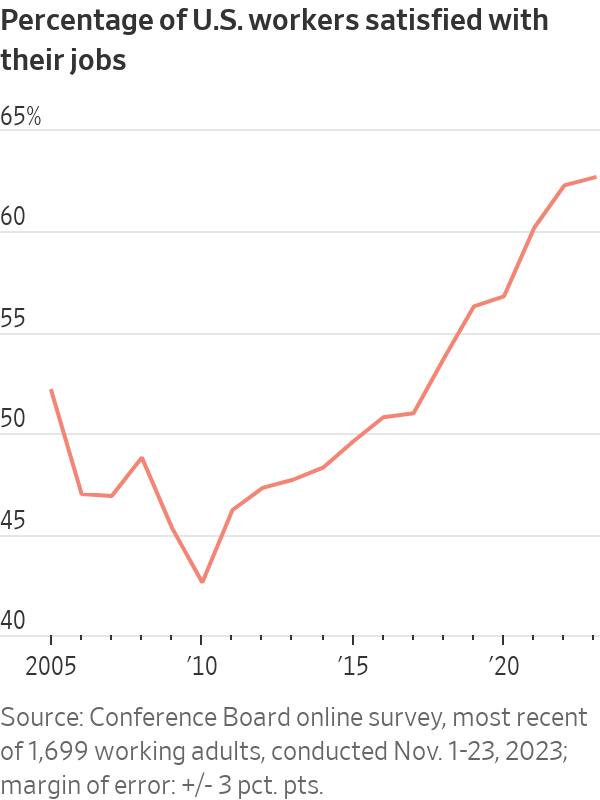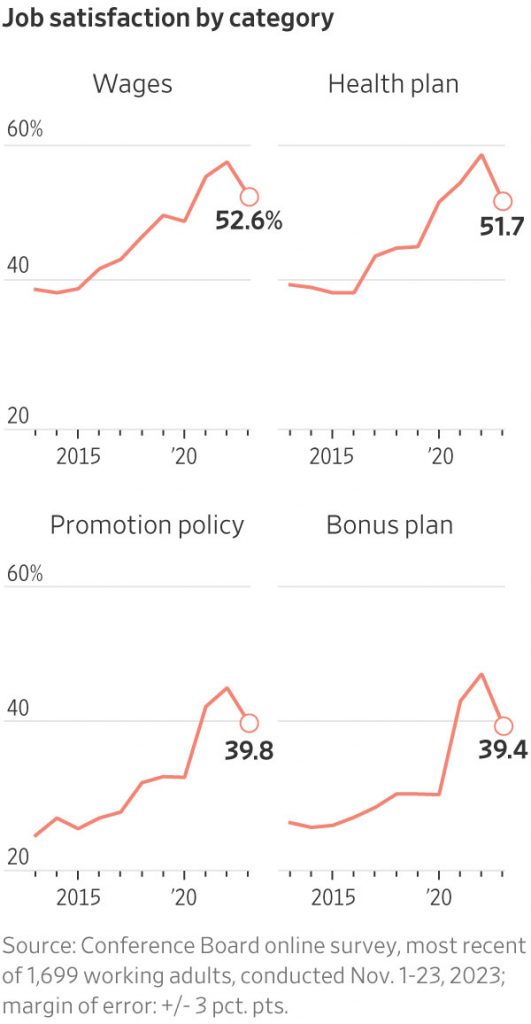Americans say they are happy at work. Are they really?
When asked how they feel overall about their jobs, most U.S. workers are positive, with 62.7% saying they are satisfied, according to new survey data from the Conference Board, a business-research group. That is the highest job-satisfaction rating since the survey began in 1987.
Dig deeper, though, and that figure might have plateaued, the researchers said, along with a widening gap in job satisfaction between men and women. Nearly 65% of men say they are happy with their jobs compared with 60% of women. The largest gaps in satisfaction between men and women were related to financial benefits of work, such as wages, benefits and bonuses.
Despite overall satisfaction ticking higher in the past year, drops were recorded in all 26 specific categories that workers were asked about—from wages to work-life balance. Those declines indicate that overall job satisfaction is at risk despite the record overall job-satisfaction rating.
“We’ve never had a year where we’ve had that paradox,” Allan Schweyer , a principal researcher at the Conference Board, said.
The American worker has a lot of reasons to feel upbeat. Unemployment has been below 4% for two years, wages finally started growing faster than inflation last summer and wealth has been bolstered by rising stock and home prices. In many white-collar jobs, employees enjoy latitude to work from home or flex their hours. The latest jobs report shows a still-strong labor market, though unemployment ticked up to 3.9% from March’s 3.8%.

A confluence of negative factors has accompanied the positives. While inflation is down from a year ago, household budgets still feel squeezed by the cumulative rise in prices since 2021. High mortgage rates and home prices make it difficult to move or buy one’s first home. Workers are hungry for a promotion, raise or both . Eighty-five percent of 1,000 U.S. professionals polled are considering looking for another job , according to LinkedIn.
“In general, people are saying, ‘I’m OK because I have a job,’” said Dana Peterson , chief economist at the Conference Board. “But they are worried about the future.”
Earlier this year, 23% of chief executives surveyed by the Conference Board said they expect to lay off workers in the next 12 months, up from 13% of CEOs predicting layoffs in a survey conducted in the fall.
The steepest drops in satisfaction compared with a year earlier were registered for wages, promotions, health plans and bonuses. The survey of nearly 1,700 U.S. adults also looked at specific segments of the workforce, including people who work from home, women and those considering job changes.

Culture club
Workers have found a new reason to stay at their jobs.
In the year-earlier survey, wages were a primary driver of job satisfaction. In the latest survey, more than three-fourths of all job stayers, defined as those who intended to remain in their jobs, said they were satisfied with the organizational culture of their employer. For job leavers, defined as those who intended to move on, 21.8% were satisfied with culture. The gap of more than 55 percentage points was one of the highest reported, and reflects what a big driver culture is to retaining employees, Schweyer said.
Mike Huynh , a manager in sales planning and analytics for Walt Disney , said he felt an initial euphoria when the company awarded him a 25% raise two months ago. The feeling only lasted a day.
Since then, Huynh’s weekly hours have increased to about 70 each week, up from 40. There are more meetings and weekend work. The higher pay helps cover the mortgage and taxes, but the money is a lot less meaningful than he thought it might be.
“It’s not Jeff Bezos money,” he said.
While Huynh yearned for a big raise, he said he realizes it isn’t as big a deal as he thought it would be. Work culture means more to him now—and it is a big reason he has stayed with the company.
“Being able to rely on the people I work with is way more meaningful than just money,” he said.
The flexible-work discount
Hybrid and remote workers are among the happiest in the Conference Board’s survey.
In 2023, 65.5% of hybrid workers reported overall job satisfaction, which was slightly higher than 64.1% of fully remote workers. People who work full time on-site reported the lowest satisfaction, at 60.2%.
Amelia Castilla , an associate partner at software company Atlassian , said she has turned down higher-paying job offers from other companies that would have required her to come to the office.
“The lifestyle where I can write my own schedule doesn’t have a price,” said the 39-year old single mother of a nine-year old.
Since Atlassian went all-remote in 2020, Castilla has set her own hours, allowing her to pick up her son at school and organize playdates. She goes to the Austin, Texas, office to get together with co-workers, which can happen from once a week to once a month.
Women warriors
Despite many companies introducing more family-friendly policies, such as daycare at work and mental-health services , the women surveyed were less satisfied with their jobs than the men for the sixth year in a row.
Women, in particular, might sense a more profound loss of remote-work benefits as employers continue to push for their employees to show up more, said Frances Frei , a management professor at Harvard Business School.
“Once workers have these wonderful new benefits, those benefits have legitimacy,” Frei said.
Flexible workplaces might also be creating more gender segmentation, Frei said. For instance, in a less formal work environment, if “mentors are informally telling mentees on the squash court about new opportunities, that may only benefit certain people who are like them,” such as men.
Boston-based respiratory therapist Shamima Mather worked in hospitals until 2022, and said the hierarchy was generally straightforward: “The environment is female-dominated as far as the workforce. But positions of power is where the men are.”
She recently left to work for a health startup and appreciates the more egalitarian approach.
“It’s just work,” she said. “We all jump in and do it.”
Write to Anne Marie Chaker at Anne-Marie.Chaker@wsj.com



